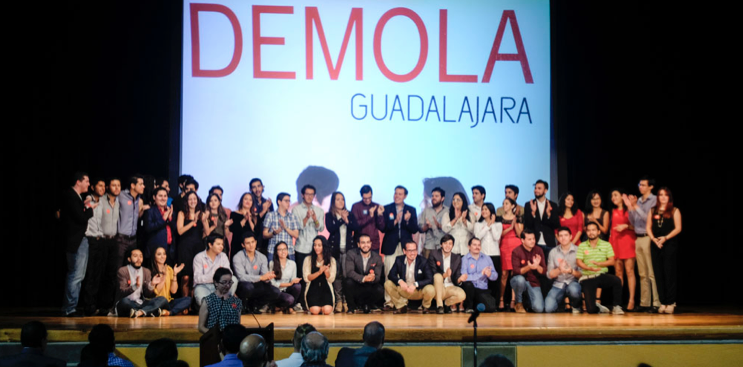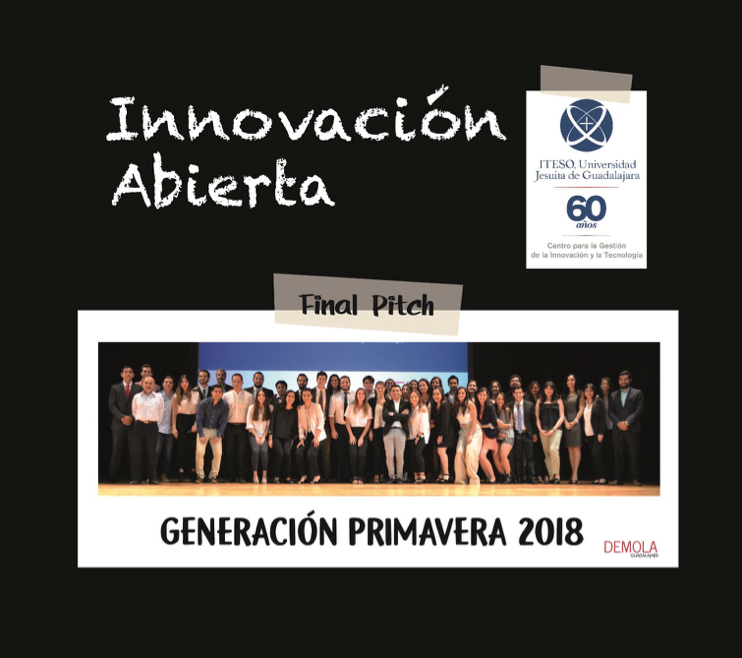Summary
ITESO, located in Western Mexico, is a private institution of higher education committed to sustainable development and social justice. In its educational model, ITESO has established certain competencies that all of its undergraduate students are expected to develop, and one of them is innovation and entrepreneurship. In order to enhance this competency, students from the areas of engineering, humanities, and business -- the three divisions which the University’s undergraduate programs are organized -- collaborate within an internal ecosystem that is being redesigned continuously with an eye towards sustainability-oriented entrepreneurship. This university initiative started as a pilot program in 2013, and is strategically documented in the current academic development plan.
Social innovation and entrepreneurship are explored from a sustainability perspective by Schaltegger and Wagner, who identify different varieties -- eco-entrepreneurship, social entrepreneurship, institutional entrepreneurship, and sustainable entrepreneurship -- within a macro-category called Sustainability Oriented Entrepreneurship. This approach has been complemented by the insights of Wendy Phillips and other authors, who point out that innovation does not happen exclusively with the entrepreneur or the social initiative, but rather within a social system which they both inhabit.
This type of insight, combined with ITESO’s fundamental orientations, have strengthened the design of a sustainability-oriented internal ecosystem for the development of the innovation and entrepreneurship competency. It is important to recognize that this ecosystem is just one link in the chain of organizations and individuals who bring a wide range of resources to sustainable innovation and entrepreneurship initiatives beyond the walls of ITESO.
The ITESO Ecosystem
An ecosystem is defined as a community of living beings whose vital processes are interrelated. By analogy, an innovation and entrepreneurship ecosystem can be seen as an environment or community where organizations and people are linked in such a way that their interrelations generate value and positive interdependence.
The generation of learning experiences that will nurture formation for sustainable innovation and entrepreneurship is a challenge that calls for a systemic vision, because it requires much more than the implementation of a course or two. It also requires the dimension of immersion in an ecosystem of programs and actors within the university who promote and contribute to the formation of innovative entrepreneurs, while simultaneously reaching out to other outside ecosystems. Fundamental actors who complement the ITESO ecosystem are business owners who are convinced of the value of bringing innovation processes to their organizations through engagement with members of the university community.
In the ITESO ecosystem, the transversal platform of communication and contact with students is anchored in a mandatory course that they take between their third and fifth semesters. This platform is available for all undergraduate degrees and has been developed with a focus on challenge-based learning, using lean start-up methodologies and person-centered design thinking. This course, called “Innovation and Entrepreneurship,” is offered in both face-to-face and online modalities, in Spanish and English. It is taken by both Mexican students and international exchange students. The faculty team that teaches the course includes 20 diverse profiles; these professors have facilitated, with the methodological approach mentioned above, a process of engagement with actual start-ups that are developing in the vibrant economic ecosystem that is the Guadalajara Metropolitan Area.
Once students come into contact with the content, collaboration networks, and mentoring that the base course provides, they identify other programs in the internal ecosystem and have the chance to engage with them. These programs include:
ITESO Business Incubator
In order to work with the wide range of start-up projects, and in line with its orientations, ITESO has set up two entities: the Basic Incubator and the High-Impact Incubator. Both offer pre-incubation, incubation, and acceleration services. The incubators work in synergy during the inception stages and develop follow-up plans adapted to the entrepreneur’s needs and the institution’s available resources in the incubation and acceleration stages, understood as execution.
DEMOLA Guadalajara: Open Innovation Lab.
ITESO offers a space within its catalogue of Professional Application Projects in which students execute an open innovation circuit over the course of 16 weeks. This open innovation lab is called DEMOLA Guadalajara, and it shares with the “Innovation and Entrepreneurship” course the base methodology of lean start-up. DEMOLA is a Finnish organization that coordinates a worldwide network of universities with which it works to foster the development of its innovation and entrepreneurship ecosystems. DEMOLA Guadalajara was developed at ITESO with support from the World Bank and the Mexican Ministry of Economy in 2014. The first generation of DEMOLA Guadalajara started working in January of 2015, and since then there have been two DEMOLA generations per year. In each open innovation cycle, students from the 7th to 9th semester, from different study programs, and even different universities, take part in innovation teams to solve problems proposed by real businesses, problems for which there are no pre-conceived solutions. The intellectual property of each DEMO that is presented belongs to the students, and if the business is interested in applying the proposed DEMO or developing it further, it must enter into a licensing or assignment of rights negotiation through ITESO’s Knowledge Transfer Unit. The profile for becoming a partner business (as businesses that propose DEMOLA challenges are known) consists primarily of: 1) having a problem or challenge within the business for which no solution has yet been found; 2) being willing to assign a person from the business -- preferably a decision-maker -- to the DEMOLA team, with weekly work hours on site, and 3) signing a mutual confidentiality and rights agreement with respect to the DEMO that is developed.

ITESO Photo
Design Innovation Workshops
Design innovation workshops offer laboratory and production workshop services to students and professors from the Department of Habitat and Urban Development (DHDU), with the collaboration of some groups from the Department of Technological and Industrial Processes (DPTI). The overall purpose is to link the theoretical concepts covered in different courses with actual production processes as they are carried out in industries and businesses in the region. This objective is applicable to the internal ecosystem when students come to this area of the campus to develop prototypes and refine them using 3-D printing or manual, automatic, and digital graphic production. When possible, and in accordance with the regulations governing the use of lab facilities, the prototype can be developed in other areas of campus, making use of available infrastructure.
In order to leverage the student initiatives, there are other services available for entrepreneurs in the University Business Center (CUE) and the Center for Innovation and Technology Management (CEGINT); these services go beyond the formation and experimentation stage and focus on actual start-up and implementation.
DEMOLA: As a Capstone Experience Within the ITESO Ecosystem
Within the ITESO ecosystem, the DEMOLA open innovation lab represents a capstone experience where students integrate the knowledge and skills they have acquired throughout their years of study. This is the logic behind the decision that students take part in this lab during their final semesters at ITESO, engaging with real businesses to solve specific challenges in interdisciplinary teams. Some of the experiences in 2016 and 2017 have been:
- A company that develops technology for people living with an ostomy (a surgical procedure on the digestive tract). A person can need an ostomy suddenly without expecting it, due to illness or an accident. His or her life changes radically and the emotional impact can be devastating on both the family and the patient. The company develops technology for people living with an ostomy, but never considered the emotional side of the patients’ condition. The demo product that came out of the process was an app with different functions aimed at improving the life of people living with an ostomy. An English company with representation in San Francisco presented the challenge and acquired the license to the solution.
- A company from the construction industry lacks a dedicated innovation department, but its directors are interested in developing building materials from recycling processes. This case is being developed in the Technology Business Incubator, where work is being done on a prototype for interior walls that includes recycled plastic and offers a more sustainable option than other materials available on the market. In this case, the license was not acquired; however, students and business people are analyzing the possibility of collaborating, depending on the results of the prototype.
- Other projects for social enterprises have been taken on, from the coffee industry and food banks, to name two examples. The students involved in these initiatives have not sought licensing or association; rather, they have decided to donate their demo proposals to benefit those organizations that make a positive impact on society.
Shared Reflections
The internal ecosystem has had positive results; some worth highlighting are:
- Students’ immersion in sustainability initiatives as key learning experiences in the first few weeks of the base course;
- The promotion of interdisciplinarity among students, professors, and business people;
- The collaboration of a variety of programs in different stages of students’ personal development and maturation;
- The incorporation of mentoring in processes of accompaniment and the initial construction of students’ networks of professional contacts, and
- The open innovation strategy as an integrational component leading to contact with external ecosystems.
With respect to future projections, we would like to point out two specific areas of opportunity: The design of a monitoring and impact measurement system to orient the ecosystem’s evolution and the possibility of using it in other ecosystems around Mexico. In the university context, proposals such as the creation of instruments that measure students’ entrepreneurial intentions -- the case of GUESSS (Global University Entrepreneurial Spirit Students' Survey) comes to mind – and could offer key support for determining improvement and redesign measures based on more than the information collected by the basic evaluation instruments that the university currently deploys. For future research, there is a chance to design an instrument that will measure sustainability-based entrepreneurial intentions.

ITESO Photo
Authors’ bios
Claudia Ibarra Baidón
Coordinator of the Academic Unit for Management, Innovation, and Entrepreneurship at the ITESO Business School. Research interests: sustainability-oriented entrepreneurship and the ethics of social entrepreneurship.
Juan José Solórzano Zepeda
Coordinator of the Technology Business Incubator and the DEMOLA Guadalajara Open Innovation Lab at the ITESO Business School. Collaboration interests: technological entrepreneurship and regional innovation nodes.
Works Cited
Stefan Schaltegger and Marcus Wagner. «Sustainable Entrepreneurship and Sustainability Innovation: Categories and Interactions.» Business Strategy and the Environment, 2011: 222-237.
Wendy Phillips, Hazel Lee and Abby Ghobadian. «Social Innovation and Social Entrepreneurship: A Systematic Review.» Group & Organization Management, 2015: 428-461.


